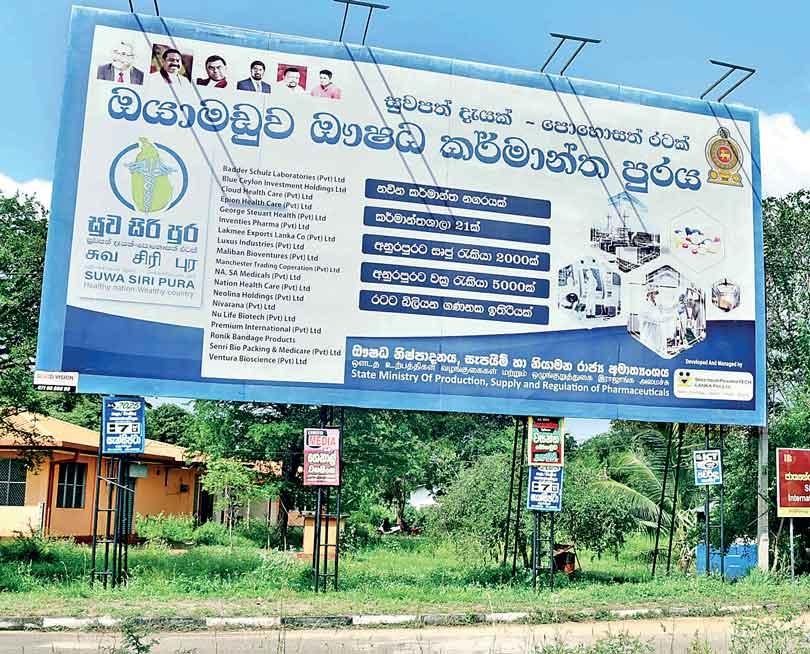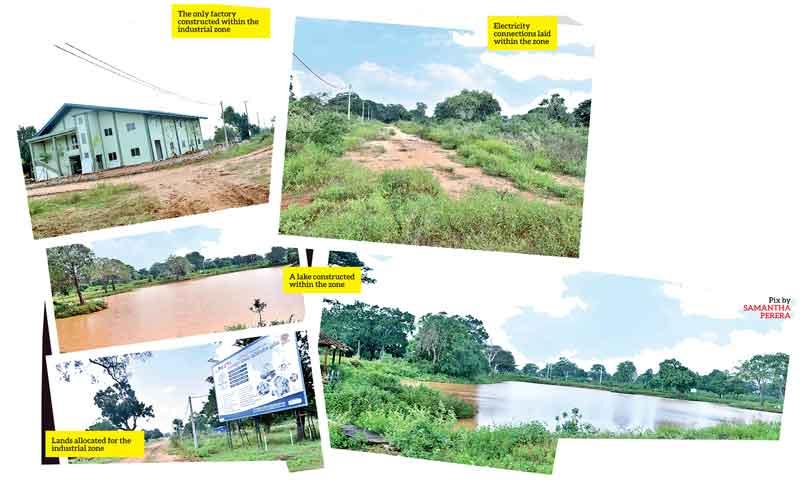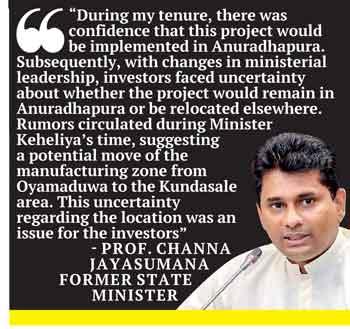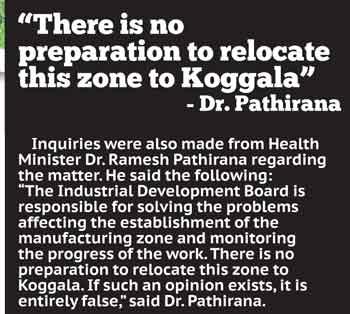29 Feb 2024 - {{hitsCtrl.values.hits}}

Out of the 400 acres allocated for Deyata Kirula, 80 acres was designated for the pharmaceutical investment zone. Twenty-four medium-sized businessmen were prepared to invest over 300 million USD in the project

 In 2021, former President Gotabaya Rajapaksa had a goal to produce 50% of the country’s pharmaceutical needs locally by the year 2024. This goal was set during a time when the state was spending Rs 130 billion annually to import the needed quantum of pharmaceuticals. The government’s plan was to offer high-quality medicines at affordable prices to both the foreign market and the local population. Consequently, steps were taken to establish a pharmaceutical manufacturing zone in Sri Lanka to meet recommendations and standards of the World Health Organization (WHO).
In 2021, former President Gotabaya Rajapaksa had a goal to produce 50% of the country’s pharmaceutical needs locally by the year 2024. This goal was set during a time when the state was spending Rs 130 billion annually to import the needed quantum of pharmaceuticals. The government’s plan was to offer high-quality medicines at affordable prices to both the foreign market and the local population. Consequently, steps were taken to establish a pharmaceutical manufacturing zone in Sri Lanka to meet recommendations and standards of the World Health Organization (WHO).
 Eighty-five percent of the nation’s pharmaceutical requirements are sourced from imports.The annual expenditure on imports amounts to 130 billion rupees. During that period, the government foresaw making a potential annual saving of 60 billion rupees by meeting the nation’s pharmaceutical needs domestically. This calculation was based on the fact that Sri Lanka rated as the highest importer of drugs in Asia. Former President Gotabaya Rajapaksa, urging an immediate change in this situation, sought local large-scale investors capable of contributing to the production of medicines in the country.
Eighty-five percent of the nation’s pharmaceutical requirements are sourced from imports.The annual expenditure on imports amounts to 130 billion rupees. During that period, the government foresaw making a potential annual saving of 60 billion rupees by meeting the nation’s pharmaceutical needs domestically. This calculation was based on the fact that Sri Lanka rated as the highest importer of drugs in Asia. Former President Gotabaya Rajapaksa, urging an immediate change in this situation, sought local large-scale investors capable of contributing to the production of medicines in the country.
The site where the Deyata Kirula exhibition took place in Oyamaduwa, Anuradhapura was chosen for a pharmaceutical investment zone. The land was owned by the National Livestock Development Board. Out of the 400 acres allocated for Deyata Kirula, 80 acres was designated for the pharmaceutical investment zone. Twenty-four medium-sized businessmen were prepared to invest over 300 million USD in the project.
Forty two (42) percent of the country’s total pharmaceutical and medical equipment requirements are to be produced by these pharmaceutical industries. The foundation stone for the factory of this initiative, named Oyamaduwa “Suvasiripura” pharmaceutical manufacturing zone, was laid in 2021 by former Minister of State for Pharmaceutical Production, Supply, and Regulation, Prof. Channa Jayasumana. Through the project there is an aim to manufacture 236 types of medicines and 44 surgical instruments within Sri Lanka. The goal for this initiative was to manufacture all drugs feasible for production within the country. It was to be done adhering to international standards. High-quality drugs were to be produced and made available to patients at a low cost. The project was to be initiated by local investors and its entire cost was to be borne by them. The foundation stone for the factory was laid in 2021, and the plan was to complete the facility within three years. However, although the plan remains unchanged, the construction of pharmaceutical factories is currently progressing at a slow pace. Approximately 100 project name boards can be found in the manufacturing zone and surrounding towns. The land, covering 80 acres, has undergone a clearing process leading to the removal of large Palu and Buruta trees. The tank in this precinct that catered to the animals in providing them with water had also been developed in such a way that it no longer serves this purpose. At present when one walks around this manufacturing zone, such transformations are strikingly evident. However, despite all these changes to the environment the manufacturing zone does not appear to have commenced operations.
 There is a proposal to lease plots of land for a period of 35 years with a tax holiday for the first 5 years. This facility will be provided to selected investors who are involved in the pharmaceutical manufacturing zone. The Ministry of Health has planned to provide guidelines in the production, supply and regulation of medicines in this proposed pharmaceutical production zone, which will be operated as a strategic development project under the State Ministries. The cabinet has also approved this project because of its significant benefits to the country. Twenty four investors for this project were chosen by an expert committee after considering proposals from qualified investors. The then government announced that the anticipated investment by these investors for this project was over 300 million rupees. However, due to the prevailing unfavourable political climate and economic challenges in the country, the construction of these pharmaceutical factories was subject to continuous delays. Though about 20 factories were initially expected to be completed within three years, only one factory has been built so far; even its construction is not yet complete. The foundation stone for the second factory was laid last January.
There is a proposal to lease plots of land for a period of 35 years with a tax holiday for the first 5 years. This facility will be provided to selected investors who are involved in the pharmaceutical manufacturing zone. The Ministry of Health has planned to provide guidelines in the production, supply and regulation of medicines in this proposed pharmaceutical production zone, which will be operated as a strategic development project under the State Ministries. The cabinet has also approved this project because of its significant benefits to the country. Twenty four investors for this project were chosen by an expert committee after considering proposals from qualified investors. The then government announced that the anticipated investment by these investors for this project was over 300 million rupees. However, due to the prevailing unfavourable political climate and economic challenges in the country, the construction of these pharmaceutical factories was subject to continuous delays. Though about 20 factories were initially expected to be completed within three years, only one factory has been built so far; even its construction is not yet complete. The foundation stone for the second factory was laid last January.
But the government could not open even a single factory for a period of three years. This was in a situation where emerging evidence suggested that some individuals in the health sector were involved in importing substandard drugs at higher prices and thereby purporting an island wide shortage of drugs. Against this backdrop, the citizens of this country would certainly experience greater benefits if the interest in developing the pharmaceutical manufacturing zone in Oyamaduwa is pursued. If this project becomes a reality patients would be able to purchase quality medicines at lower prices. However, there is sufficient doubt to entertain the thought whether delaying the establishment of the zone has benefited certain individuals. This is because there is information regarding a drug fraud.
Furthermore, the Ministry of Health took steps to rearrange investments in this manufacturing zone by securing agreements with companies interested in investing in the project. Twelve such companies signed these agreements in an event chaired by Keheliya Rambukwella, the Health Minister at that time. Contracts for these investments were also offered. However, although 24 companies had initially agreed to invest in this manufacturing zone, only 12 factories ultimately became part of the investment.
The delay in investment by the relevant companies in the pharmaceutical manufacturing zone was not solely attributed to the economic crisis. Numerous challenges have emerged in providing infrastructure for the factories under construction. There are also issues related to water, electricity, concerns about wild elephants and difficulties in obtaining technical support from the Department of Wildlife and Conservation (DWC) when constructing elephant fences. Recent discussions have taken place between the relevant investment companies and the Ministry of Health. Given these circumstances, the government should possess the capability to address these issues promptly, offer solutions to the problems and provide encouragement to the investors.
During Keheliya Rambukwella’s tenure as Minister of Health, companies including Maliban Bioventures (Pvt.) Ltd, George Steuart Health (Pvt.) Ltd, Luxus Medicine (Pvt.) Ltd, Premium International Biologics (Pvt) Ltd, Epione Health Services (Pvt.) Ltd, NU Life Biotech (Pvt.) Ltd, Neolina Holdings (Pvt.) Ltd, Nivarana (Pvt.) Ltd, Blue Ceylon Investment Holdings (Pvt.) Ltd, Meditech Lanka (Pvt) Ltd, and Clean Ozo Bio – Bin’s (Pvt) Ltd signed contracts to be involved in this project. If these companies have not yet initiated their activities, the government should inquire into these delays and address any issues that may have affected the progress of the operation. Quick action taken to kick start this zone could potentially elevate the production of local medicines from the current 15-20 percent to a substantial 60-80 percent level.
Due to the establishment of this pharmaceutical manufacturing zone, 2000 direct employment opportunities will be generated for the youth in the area. Additionally, more than 5000 people will benefit from indirect employment opportunities. The total investment for the zone amounts to 80 billion rupees. The Ministry of Health maintains that these investments are coming through local investments.
According to an announcement from the Ministry of Health, Spectrum PharmaTECHLanka Pvt Ltd, a Sri Lankan subsidiary of Spectrum PharmaTECHConsultants Pvt. Ltd, India, will be responsible for the development and management of the manufacturing zone. There are plans to export these pharmaceutical products; the anticipated annual income from this project is about one billion dollars. Dr. Ramesh Pathirana, the Minister of Industry and Health, has assured investors that the infrastructure challenges affecting the establishment of the manufacturing zone will be promptly resolved and the pharmaceutical manufacturing zone will be inaugurated. This assurance was given during a discussion between the Minister and representatives of the Oyamaduwa Pharmaceutical Manufacturers Association.
This newspaper also made inquiries from Manjari C. Chandradasa, Divisional Secretary of Maha Vilachchiya, regarding the issues causing delays in this project. She had this to say: “The Ministry of Health decided who would oversee this project in this manufacturing zone that was initiated at the end of 2021. We were instructed to allocate land for this purpose. Consequently, we allocated 80 acres to initiate 20 factories. Subsequent land allocations were based on the specific needs of the respective factories. The plan was formulated by the Ministry of Health. Lease approval has been granted for 19 out of the 20 plots of land. Presently, 10 plots of land have been designated for leasehold preparation. At present, one factory is in the final stages of construction, and the foundation stone for another factory has been laid,” she stated.
Inquiries were also made from former State Minister Professor Channa Jayasumana on this matter. The former state minister shared the following perspective: “Investors initially stepped forward to start the manufacturing zone with the understanding that the government would purchase all medicines produced by this project. Additionally, there was a plan to export surplus medicines. However, when the Covid-19 epidemic emerged, investors hesitated due to the prevailing situation in the country. This was because questions arose whether the government would buy these medicines, or whether the investors would be able to sell the medicines they produce. During my tenure, there was confidence that this project would be implemented in Anuradhapura. Subsequently, with changes in ministerial leadership, investors faced uncertainty about whether the project would remain in Anuradhapura or be relocated elsewhere. Rumors circulated during Minister Keheliya’s time, suggesting a potential move of the manufacturing zone from Oyamaduwa to the Kundasale area. This uncertainty regarding the location was an issue for the investors. Later, there was speculation about relocating the manufacturing zone to Koggala. Consequently, investors hesitated again to invest. Their concern is that, despite investing in building a manufacturing zone, the medicine will not be purchased and that contributed to the delay in the project,” said Prof. Jayasumana.
“But Oyamaduwa still remains as the ideal location for the pharmaceutical manufacturing zone. There are necessary facilities and infrastructure in that area. I still opine that the same area is the most suitable for that purpose,” Prof. Jayasumana added.
If this manufacturing zone is beneficial for the country, the government should intervene and initiate it promptly. However, if there is a change of ministers who are in charge of this subject and the successors of the past minister attempt to move such projects to their areas of preference, the delays that are caused due to such developments cannot be approved.
02 May 2024 6 hours ago
02 May 2024 7 hours ago
02 May 2024 7 hours ago
02 May 2024 8 hours ago
02 May 2024 9 hours ago